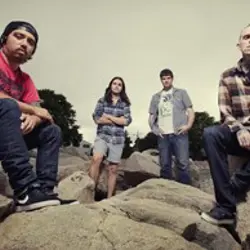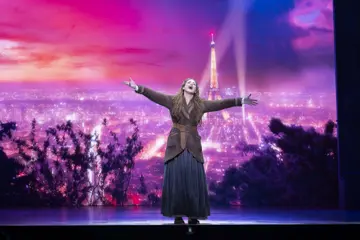 Converge
ConvergeWith the world hanging in a precarious state of simmering turmoil which threatens to boil over at any moment, it seems only fitting that the latest effort from New England hardcore veterans Converge is their most relatable and emotional. The band needs little in the way of introduction, and has always demonstrated an awareness of two fundamental aspects for making a great, memorable hardcore record: balanced sequencing, in terms of a nuanced track listing; and an album opener that goes straight for the gut (see: ‘Dark Horse’ and its rabid-dog intensity; the percussive unravelling on ‘Aimless Arrow’; ‘Heartache’ and its stop-start transitions; or the forever-imitated, snare-drum detonations of ‘Concubine’). With this mission statement in mind, the band now return from a five-year absence to deliver their ninth studio LP, ‘The Dusk In Us’.
To satiate long-time fans, who desperately craved new material, Converge released the promotional single ‘I Can Tell You About Pain’ (featured on a 7-inch release with the ethereal ‘Eve’) and its haunting music video in July of this year, in lieu of announcing the formal release of ‘The Dusk In Us’. The high-energy track was a welcome throwback to the band’s chaotic ‘You Fail Me’-era, with vocalist, front-man and artist Jacob Bannon alternating between indomitable throat-shredding and pronounced spoken word sections, telling the tale of a manipulative and abusive relationship, declaring quite forcibly: “You don’t know what my pain feels like!” Follow-up ‘Under Duress’ presented an alternate vision: ominous, lurching riffs weaved around thick, nasty grooves and choral vocals, almost as if Baroness got bored and started jamming on their favourite Melvins songs. The final taster came in the form of ‘Reptilian’, a sludge-riddled barnburner which probed the murky depths previously trawled by Mastodon or High On Fire. Again, Bannon took centre-stage here, with a serrated lyrical poignancy that couldn’t help but be shaped by current events: “Devils do not need a hell in order to exist,” and “We must lose sight of the shore, to know what courage means/We must lost sight of who we are, to know what we can be.”
It’s a testament to Converge’s desire to craft entire albums, rather than ‘hit singles,’ that the tracks above are featured fifth, third and thirteenth (i.e. last) respectively. Each song acts like a piece of a jigsaw puzzle: singular shapes that, individually, are significant and purposeful, yet only become greater when conceived as part of a more complex whole. Converge understand this concept better than most of their peers, which is why album opener ‘A Single Tear’ has the most simple and effective shape of them all. The track is propelled along by guitarist/producer/engineer Kurt Ballou’s multi-faceted riff dynamics – cursive yet compact; effortlessly switching between violent and vital – and drummer Ben Koller’s crushing double kicks. Bannon sings of the perception of love, with a level of fragility almost unbecoming of a band this intense and heavy, before his voice breaks down to a raw and primal utterance in the bridge, a moment that can only be described as ‘hair-raising’. It’s an album highlight for ‘The Dusk In Us’ and it arrives in the first three minutes—something only Converge could pull off whilst feeling completely natural.
Elsewhere, ‘The Dusk In Us’ is littered with engaging and inspiring feats of musical dexterity. There are short bursts of rage and aggression, which hover perilously around the two-minute mark: the sheer explosion of ‘Cannibals’; ‘Broken By Light’s jagged chords and vicious breakdown; Ballou’s incessant noodling woven around bassist Nate Newton’s rumbling tones on ‘Eye of the Quarrel’. The album also features various nods to different shades of 90’s hardcore: the mathy time-warping displayed on ‘Arkhipov Calm’; the feedback face-ripping of ‘Murk & Marrow’; or the mid-tempo, Fugazian post-hardcore cut ‘Trigger,’ which also happens to feature Bannon’s most audible use of the f-bomb in the group’s entire career. These tracks are then deftly juxtaposed against Converge’s longer, more reserved compositions. The title track functions as the album’s centrepiece and moral crux; a sombre doom-ballad with post-rock/ambient tendencies, which could have easily been included as part of Bannon’s experimental side project, Wear Your Wounds. While it’s clear that ‘Thousands Of Miles Between Us’ has been floating around, in one form or another, for some time, especially given that its title was used for Converge’s 25th anniversary, live feature set in 2015. The track itself is a slow-burn dirge of the Neurosis school, with Bannon and Newton trading croons on the subjects of adversity and resilience: “There is no place in this world to hide/My shattered smile that life provides/Stand up straight, take it on the chin/Pick up my teeth and start again.”
[caption id="attachment_1098716" align="aligncenter" width="1400"] Photo credit: Reid Haithcock.[/caption]
Photo credit: Reid Haithcock.[/caption]
Don't miss a beat with our FREE daily newsletter
It’s here that I need to (poorly) segue this review with a confession and get something off my chest: when I first heard the unrelenting force of nature that is Converge, I didn’t quite ‘get it’. Now admittedly, and in my defence, I was 18 years old at the time, and more concerned with making ends meet (a.k.a. living week to week) than developing a refined musical palette. However, in 2007, I was fortunate enough to see the band perform in support of their sixth studio album ‘No Heroes,’ and, as anyone who's bor witness to a Converge live show will tell you, I was utterly transfixed by the sonic assault on display. Their performance that evening would be best described as controlled chaos: the band roaring through track after brutal track with piercing and muscular tones, Bannon working the room like some kind of demonic ringmaster, the crowd swaying as a maelstrom of limbs with every raw scream and indecipherable lyric. While the profundity of the Converge’s music wasn’t immediately apparent to me then, they certainly had my attention, and I would make concerted efforts to ‘crack the code’ for years to come.
The breakthrough came with 2009’s magnum opus ‘Axe To Fall’: a record described by KYS's former editor Kane Hunkin, as “[adding] further diversity to what has become the iconic hardcore sound of the past decade.” At the request of a close friend, I gave ‘Axe To Fall’ a cursory listen upon its release, thinking it would become just another impenetrable wall of noise, when, to my astonishment, I was hooked from the very beginning. Opener ‘Dark Horse’ and its aforementioned intensity; the epic build-up in ‘Worms Will Feed/Rats Will Feast’; the haunting carnivalesque of ‘Cruel Bloom’; the gut-wrenching melancholy of ‘Wretched World’ — it was as if a switch had been miraculously flicked in my brain and everything had suddenly ‘clicked’ into place. Revisiting the band’s back catalogue, along with my newfound understanding and appreciation, Converge’s mystery and allure had finally crystallised into a clear and distinct idea.
I take this detour down memory lane to illustrate the central tenet behind Converge’s enduring legacy: this Massachusetts quartet make music purely for themselves and no one else. Their music isn’t meant to be easily digested, it should be savoured; and like any expression of art that’s inherently worth a damn, it demands a level of work be done by the audience in receipt. This is a band that has operated in (and dominated) the upper echelons of extreme music for close to three decades, with over half of that time featuring their current four-piece line-up—a level of perseverance, longevity and dedication almost unheard of in contemporary metal and hardcore circles. As Bannon himself admits, the band “[doesn’t] really look to any outside influences all that much anymore.” And truthfully, why should they? Even with a myriad of side projects between members and significant gaps between releases, Converge still manage to sound fresh and exciting on ‘The Dusk In Us,’ lightyears ahead of their peers, seemingly unperturbed by fashions, trends, or the demands of an increasingly fickle and facile music industry.* They’re a group of hard-working, deeply focused individuals who deserve every hyperbolic accolade thrown their way.
For example, Pitchfork once described Converge as “this generation's Black Flag,” and if it’s praise for praise’s sake that you’re after, then look no further than the band’s seminal album, 2001’s ‘Jane Doe’. Initially panned by critics upon release, the record has since reached near-mythic status among fans and elitists alike, being named the 61st greatest metal album of all time by Rolling Stone, and labelled as a “discordant landmark” by metal purists Decibel magazine, who also saw fit to “proudly and correctly” name it the greatest metal album of its decade. I’ll let the implications of that sink in for a moment… (Fun fact: ‘Axe To Fall’ came in at #17, and Converge were the only band to have two entries in the highly-controversial Top 20.) The point of all this being that Converge are in a league of their own musically, and have consciously pushed the envelope for what forms the dark fusion of metal and hardcore punk can take. ‘The Dusk In Us’ isn’t confined by the limitations of the genre, but instead, uses those limitations as a crucible to deform and re-contextualize their sound into an ever-changing chimaera of stark and savage beauty.
There’s a phrase which circulates through the stylised title card of the highly influential, 1998 anime series Cowboy Bebop, which states: “…the work, which becomes a new genre itself, will be called COWBOY BEBOP, will play without fear of risky things.” And while this is certainly true of director Shinichirō Watanabe’s much-loved neo-noir space western, the same could be argued for each new Converge record: the band has cultivated an artistic legacy that necessitates them having a genre unto themselves, and ‘The Dusk In Us’ is simply a new extension and foray into said genre.
It’s impossible to judge/appreciate/comprehend a Converge album from outside the context of other Converge albums. While particular tracks may push or pull in disparate sonic directions, the core of the band’s artistic drive remains steadfast; as visceral, emotional and cutting-edge as they’ve been for the last 27 years. And in terms of ‘risky things’, Bannon perhaps sums it up better than I ever could on ‘Under Duress’: “The delusions of control/Are rotting the root of the tree/It's the fear that keeps you there/And it's mine that sets me free.”
[*Side Note: Between songs during the band’s set at This Is Hardcore 2014, Bannon waxed self-reflective about their position in the current musical landscape, saying: “We know we’re an acquired taste. We’re too fucking weird for hardcore kids. We’re too punk for metal kids. And we’re just too fucking ugly for everybody else.” Ironically, it’s this somewhat isolated position that’s allowed the band to transcend easy scene definitions and become something truly iconoclastic.]
- A Single Tear
- Eye Of The Quarrel
- Under Duress
- Arkhipov Calm
- I Can Tell You About Pain
- The Dusk in Us
- Wildlife
- Murk & Marrow
- Trigger
- Broken By Light
- Cannibals
- Thousands Of Miles Between Us
- Reptilian
‘The Dusk In Us’ is due for release via Epitaph/Deathwish Inc. on November 3rd. Digital and physical copies are available here.
















